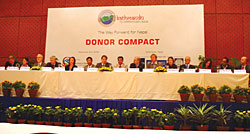 BADRI POUDYAL |
But what of the donors' violation of Nepali regulations and their own international commitments to directly implement projects and create parallel in-country aid structures? These rules strictly restrict direct implementation of projects by donors and international aid organisations. But in Nepal, donor agencies and INGOs have been setting up offices in district headquarters and sometimes even at the local level.
This appears to be not only against the domestic laws of Nepal but also contradicts the 2005 Paris Declaration on Aid Effectiveness and the 2008 Accra Agenda for Action, which set the agenda for donor governments and agencies and recipient governments. Donors agreed to make assistance more effective by harmonising aid and channelling it through central government in developing countries. But local donor offices in Nepal are increasingly subcontracting development through an interconnected web of INGOs that undermine donors' stated commitment to 'country ownership' and 'use of country system'.
The international legal status of INGOs is being changed to Nepali legal status by registering them with CDO offices, blurring the differences between INGOs and NGOs. The real intention here appears to be not 'localisation' and 'decentralisation' per se, but capturing funding both at the national and international levels.
Most INGOs have set up their Nepal offices to tap the 'year marked' monies of bilateral donors. This has not just made aid less sustainable and increased dependency, it has also resulted in wastage, duplication and aid failure and ineffectiveness. Aid policies promoted and practiced by some of the self-described 'democratic and credible donors' in Nepal have therefore ignored and undermined Nepali ownership, which past donor compacts have committed to.
INGOs should be raising funds and tapping resources from their home countries, not from the Kathmandu country offices of donors. For their part, bilateral donors are required to use in-country systems to channel development funds. Political instability in Nepal, the lack of government oversight and weak implementation of agreed guidelines have led to this situation, which must be corrected to make aid more effective.
More than 60 per cent of Nepal's development budget comes from foreign aid, but a Finance Ministry official admitted recently that there had been no progress in enforcing international aid guidelines. Donors are also reluctant to follow their own commitments in Paris and Accra for use of country systems. The Foreign Division of the Ministry of Finance, the National Planning Commission, parliament and civil society (including the NGO Federation of Nepal) are also apathetic or ignorant about the trend.
The international agreements made by donors were aimed at making foreign aid more efficient, coordinated and effective through increased donor engagement with government agencies, parliament and civil society. It is unfortunate that what we see in Nepal today is a trend in the opposite direction.
Rabin Subedi is a campaigner with the Nepal Policy Institute, a member of the Reality of Aid Global Network.
READ ALSO:
Donor dynamics, Seira Tamang - FROM ISSUE #476 (13 NOV 2009 - 19 NOV 2009)
Wages of distortion, CK Lal - FROM ISSUE #476 (13 NOV 2009 - 19 NOV 2009)



